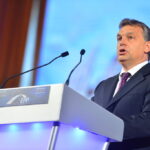Gender Ideology, LGBT+, Pride
Slovakia’s LGBT culture war
A decade ago, on a tour through Europe, a local tour guide in Belgrade stopped to ask me a question. Why, he asked, was the European Union – “the West” – so bent on getting nations like his own to accept LGBT ideology? Why were promises of economic aid always tied to demands that recipients host “pride” parades or similar initiatives? “We do not want this,” he said with irritation, shaking his head.
He is not alone. Despite the fact that many aspects of the LGBT agenda – especially the transgender agenda – are scarcely a decade old, the progressive establishments of Europe, including the EU and much of the mainstream agenda, are relentless in their attempts to “enshrine” the LGBT agenda as central to the new European identity. Nations that attempt to blunt the cultural influence of this movement face the wrath of these elites, as Hungary has discovered over the past several years. Even seeking to shield children from these influences is fought with fanatic zeal.
A similar culture war has been brewing this year in Slovakia, and the mainstream press is out in full force to shape the public narrative. The focus of this battle is Culture Minister Martina Simkovicova, the 53-year-old TV anchor who took office in October 2024 and has proclaimed herself a “defender of Slovak culture and nothing else.” Stating that she opposes “LGBT ideology,” Le Monde recently reported, she has “dismissed several heads of public institutions” including “the director of the Slovak National Theatre, Matej Drlicka, and the director of the Slovak National Gallery, Alexandra Kusa, on the spot.”
Simkovicova stated that both were engaged in “progressive-liberal political activism” that was out of line with the government’s “cultural program” and promised that the Slovak government will not give “a cent” to LGBT groups. She subsequently removed a number of government subsidies that were flowing to LGBT organizations. It is important to note that the government is establishing that they do not see LGBT ideology as part of Slovak culture and that, as such, groups who push this ideology are not entitled to public – that is to say, taxpayer – dollars.
But according to the press, this amounts to something resembling a crackdown. According to the Citizen Tribune on December 12:
“I am frustrated and very angry about the way culture is being destroyed and organizations are falling apart,” Svetlana Fialova, a 39-year-old visual artist and lecturer, told AFP. “What is happening in Slovakia is … what is happening in Georgia, Hungary and other countries, where people who collaborate and play to Russian tunes are coming to power and trying to suppress democracy and culture.”
This entirely sidesteps the actual question at hand. The democratically-elected government has a mandate to set priorities, including where public funds are allocated and which employees should be on the public purse. The debate is not about those who are anti-culture versus those who are pro-culture but about what culture the government would like to promote and subsidize. For part, Simkovicova has attempted to make this clear. “The culture of the Slovaks should be Slovak – Slovak, and none else,” she said in one speech. What constitutes a national culture and identity is always up for debate, but to claim that one side of that debate is “anti-culture” is something else entirely.
But the press, of course, presents those who oppose LGBT ideology as enemies of democracy, while portraying those who support it as its defenders – regardless of whether their agenda has public support. In Poland, the coalition government of Donald Tusk has initiated a wide-scale, often brutal purge of public institutions, eliminating employees associated with the previous Law and Justice government. This was praised by the press as a bold step in favor of democracy. But when the Slovakian government seeks to appoint its own people to public institutions, this is an attack that cannot be borne. From the Citizen Tribune:
Simkovicova also targets public media. In June, she pushed through a law reforming the state-run RTVS broadcaster into a new company, STVR, which is under her control. Analyst Pavol Hardos told AFP that wielding political influence over cultural institutions had a precedent in Slovakia.
“This is something we experienced in the 1990s during the illiberal regime of Vladimir Meciar, when there were ideological tests and tests … of who is a good nationalist, a good Slovak, and who isn’t,” he said.
What is new is the government’s “commitment to purge cultural institutions from anyone who is in any way perceived as potentially a political enemy”, Hardos said. Open-minded and liberal people are “being targeted as a potential troublemaker, and people who are often enough real experts in their areas are being sidelined or thrown out,” he added.
Hardos said that while it was premature to talk about “an illiberal regime”, Fico is walking in Orban’s footsteps. “This concerns any project with links to LGBT+,” said Martin Macko, head of the Iniciativa Inakost NGO.
Again, the default position of the press and the EU elites is that LGBT activists have a right to public positions and public money and that leftist governments have a right to appoint their ideological allies to positions of power. If democratically-elected opponents of LGBT ideology do the same, they immediately attempt to delegitimize those leaders and accuse them of launching a coup. LGBT activists and their progressive allies feel entitled to taxpayer money and tax-funded positions, and they are supported in this entitlement by most institutions.
Indeed, the opposition attempted to have the culture minister thrown out in a vote but failed. Simkovicova, for her part, accurately pointed out to the press that LGBT activists are free to produce whatever they like – they just aren’t entitled to public funding to do so. But for many LGBT activists, of course, this isn’t enough.








